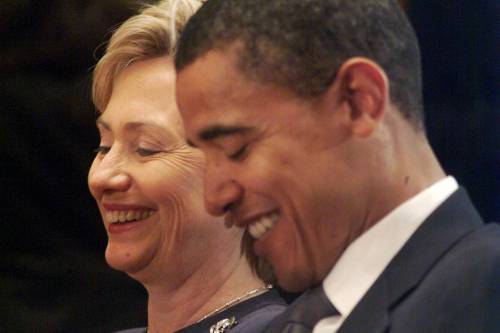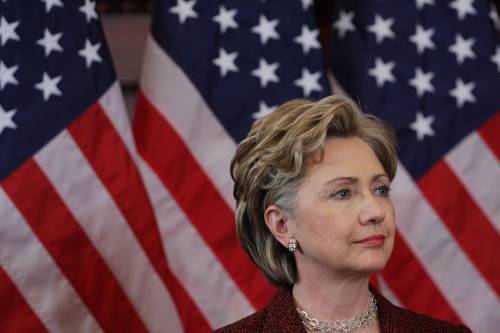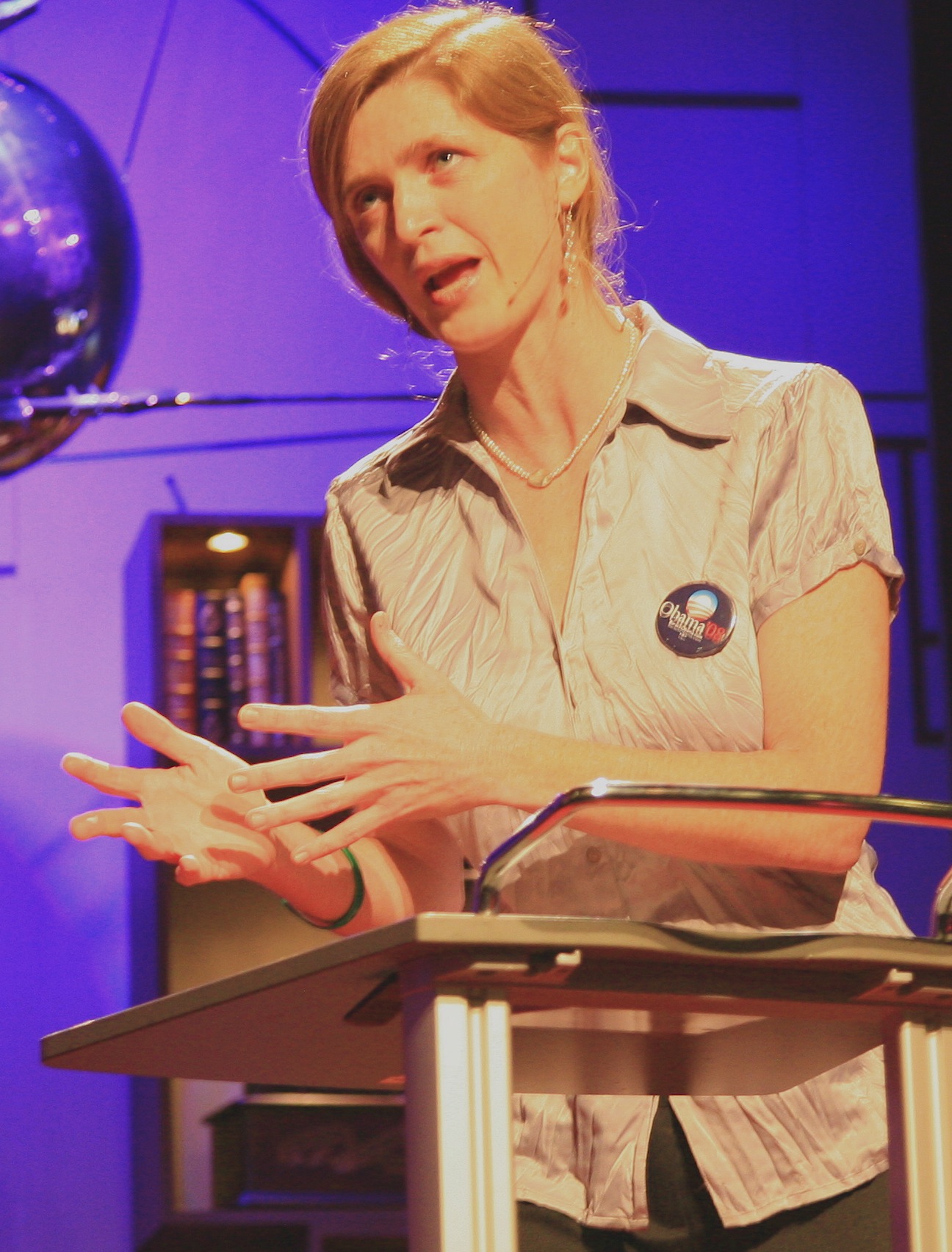Will Clinton Fill State Dept. With Loyalists?
Many foreign policy experts wonder whether a Sec. of State Hillary Rodham Clinton would reach beyond loyalists to bring in progressive Obama supporters after an acrimonious primary season.
Jul 31, 202091.5K Shares4.3M Views
Sen. Hillary Clinton and Sen. Barack Obama (WDCpix)
With Sen. Hillary Rodham Clinton (D-N.Y.) almost certain to become President-elect Barack Obama’s secretary of state, some foreign-policy experts in the Obama orbit are expressing frustration.
Clinton herself isn’t so much the problem, they say. It’s the loyalists and traditional thinkers Clinton is likely to bring into the State Dept. if she becomes secretary.
Illustration by: Matt Mahurin
The dispute is only partly ideological in nature. While the coterie of foreign-policy thinkers around Obama have been more liberal, in an aggregate sense — on issues like Iraq and negotiations with America’s adversaries — the Obama loyalists question the boldness of the Clintonites. They fear that Obama’s apparent embrace of Clinton represents an acquiescence to the conventional Democratic foreign-policy approaches that they once derided as courting disaster. Some wonder whether a Clinton-run State Dept. will hire progressive Obama partisans after an acrimonious primary.
In addition, some Obama loyalists wonder whether the same people who attacked Obama on foreign policy during the primaries can implement Obama’s agenda from State Dept. perches. “Look, Clinton and Obama are both smart people,” said one Democratic official who would not speak for the record, “and I’m sure their one-on-one relationship would be OK. But when you hire a Clinton, you hire more than just that one person, you get the entire package.” If Clinton becomes secretary of state, it’s possible that the fissures between her loyalists and Obama’s would be a significant undercurrent of the administration’s foreign-policy decision-making.
No one would comment for the record for this story from either the Clinton or the Obama camps. Several people were reluctant to speak even on background, whether out of an exhaustion with a dispute that has lasted for more than 18 months within the party or out of reluctance to jeopardize their own prospects for jobs with the Obama administration.
Some in the Democratic foreign-policy community worry about the implications for a cohesive diplomatic message, given the differences in substance and tone between the supporters of the two Democratic giants.
“Foreign policy is probably where Clinton and Obama differ the most,” said the Democratic official. “They just have fundamentally different instincts. On the big decisions, Obama can and will certainly call the shots, but the consistency of follow-through could really be a problem. And the instincts on the smaller decisions will be very different. Cohesion of our foreign policy could suffer.”
Sen. Hillary Clinton (D-NY)
Most directly at issue is the nest of appointments within the State Dept. — which in a Democratic administration is where most of the foreign-policy resumes go, as liberals traditionally gravitate toward issues involving diplomacy instead of defense. Since the terms of a prospective Clinton appointment are not yet worked out — ABC’s Jake Tapper citedan Obama aide on Thursday saying an announcement would likely come after Thanksgiving — it is unclear how much control Clinton would have over staffing the department, though veterans of previous administrations say it would be unheard of for her not to be able to bring in her own team.
“Sometimes, if you offer me a cabinet job, I take it but [only if] I get to pick all Senate-confirmable appointments, down to assistant secretary,” said one such veteran of prior administrations. “Or I get the top three and then we work out the rest.” In George W. Bush’s administration, for example, Dick Cheney placed his ally John Bolton as undersecretary of state as a check on a Foggy Bottom team that conservatives distrusted, Secretary Colin Powell and Powell’s deputy, Richard Armitage.
Some progressive Obama supporters think the arrival of Clinton at the State Dept. will mean they’ll be frozen out. That would have implications for their advancement in subsequent Democratic administrations.
“Basically, you have all of these young, next-generation and mid-career people who took a chance on Obama” during the primaries, said one Democratic foreign-policy expert included in that cohort. “They were many times the ones who were courageous enough to stand up early against Iraq, which is why many of them supported Obama in the first place. And many of them would likely get shut out of the mid-career and assistant-secretary type jobs that you need, so that they can one day be the top people running a future Democratic administration.”
In the foreign-policy bureaucracy, these middle-tier jobs — assistant secretary and principal-deputy-assistant and deputy-assistant — are stepping stones to bigger, more important jobs, because they’re where much of the actual policy-making is hashed out. Those positions flesh out strategic decisions made by the president and cabinet secretaries; implement those policies; and use their expertise to both inform decisions and propose targeted or specific solutions to particular crises.
The responsibility conferred on those offices, and the expertise developed and deepened by their occupants, shape the future luminaries of U.S. foreign policy. Susan Rice, for example, served as assistant secretary of state for African affairs in Bill Clinton’s second term and is now a leading contender for a top job in the Obama administration.
“These are your foreign-policy change agents,” said the Democratic foreign-policy expert.
Additionally, there are only so many jobs to go around. Many State Dept. positions go to Foreign Service officers and career bureaucrats. Important ambassadorships tend to go to large campaign contributors. And while the State Dept. was known as a repository of resistance to Bush during the past eight years, it has its share of Republicans, Obama-skeptics and even Bush supporters.
“State is already, like most agencies, riddled with Bush loyalists,” said a Democratic official with ties to the foreign-policy community. “If you add in a camp of Clinton loyalists, plus career staffers, none of whom are directly tied to Obama, I think it should be a serious concern to Obama. Clinton folks are known for their loyalty to the Clintons.”
There is an ideological component as well — though it is more complicated than either side typically admits. During the Democratic primaries, the Clinton campaign attracted more familiar Democratic faces from the foreign-policy community — the people derided by the liberal blogosphere as self-styled Very Serious People— who tended to be less progressive than their counterparts in the Obama campaign. The foreign-policy wing of the Obama campaign, during the primaries, considered itself as a force for redressing the timidity of the traditional Democratic foreign-policy community that acquiesced to disasters like the Iraq war.
Samantha Power (Wikimedia Commons)
“You’ve already begun to see it even before Sen. Clinton gets to the State Dept.,” said the foreign-policy official who has served in previous administrations. “Look at the people on the transition team. These are not people who necessarily supported Obama in campaign, and had different views on Iraq.”
Some Obama loyalists pointed to a 2007 memowritten by Harvard’s Samantha Power — a former leading Obama adviser who resigned from the campaign after making an untoward remark about Clinton — that summarized the Obama campaign’s ideological meta-critique of many of the people who might staff a Clinton-run State Dept. Titled “Conventional Wisdom vs. the Change We Need,” the campaign released Power’s memo to the press after the Clinton campaign labeled Obama naive for proposing negotiations with dictators without preconditions; for ruling out the use of nuclear weapons on terrorist training camps; and for proposing highly-conditioned military strikes in Pakistan against senior Al Qaeda operatives.
“It was Washington’s conventional wisdom that led us into the worst strategic blunder in the history of U.S. foreign policy,” writes Power, who declined to speak for this story. “The rush to invade Iraq was a position advocated by not only the Bush Administration, but also by editorial pages, the foreign policy establishment of both parties, and majorities in both houses of Congress. Those who opposed the war were often labeled weak, inexperienced and even naïve.”
Some in the Obama camp are left wondering whether picking Clinton as secretary of state represents an acquiescence to such conventional wisdom. “That memo was emblematic in many ways of the difference between the two groups,” said a Democratic foreign-policy expert and Obama loyalist. Asked about the ideological implications of the difference, the expert said, “The early Obama supporters were generally much more opposed to Iraq and you can draw out assumptions from there.”
Yet those assumptions are not entirely clear cut. Susan Rice opposed the Iraq war, but she was still a member in good standing of the traditional Washington foreign-policy community, ensconced at the ultra-establishment Brookings Institution. Her Brookings colleague, Lee Feinstein, signed on with the Clinton team and often criticized Obama, but he also wrote in favorof “unconditional negotiations with Iran” even before Obama entered the race.
Richard Holbrooke, a longtime progressive bete noir — and assistant secretary of state under Bill Clinton — was an Iraq war supporter, but also been a leading voice with the Campaign to Ban Torture, a bipartisan pressure group devoted to rolling back Bush’s interrogation policies. And Clinton’s campaign gained the ardent support of liberal heroes like Gen. Wesley Clark and retired Amb. Joe Wilson, both of whom opposed the Iraq war.
The Democratic official noted Obama’s stated intrigue with presidential scholar Doris Kearns Goodwin’s book “Team of Rivals,”which documented the ultimately-constructive fissures in Abraham Lincoln’s cabinet, but rejected the comparison.
“The situation is fundamentally different today than in Lincoln’s time,” the official said. “The agencies are much more vast, so the people under the secretary, who aren’t directly controllable by the president, are a much bigger part of the equation these days. And when they are part of a group like the Clinton folks, it’s a real issue. Besides, even the Lincoln cabinet was much more dysfunctional than Goodwin’s book portrayed.”

Dexter Cooke
Reviewer
Dexter Cooke is an economist, marketing strategist, and orthopedic surgeon with over 20 years of experience crafting compelling narratives that resonate worldwide.
He holds a Journalism degree from Columbia University, an Economics background from Yale University, and a medical degree with a postdoctoral fellowship in orthopedic medicine from the Medical University of South Carolina.
Dexter’s insights into media, economics, and marketing shine through his prolific contributions to respected publications and advisory roles for influential organizations.
As an orthopedic surgeon specializing in minimally invasive knee replacement surgery and laparoscopic procedures, Dexter prioritizes patient care above all.
Outside his professional pursuits, Dexter enjoys collecting vintage watches, studying ancient civilizations, learning about astronomy, and participating in charity runs.
Latest Articles
Popular Articles



